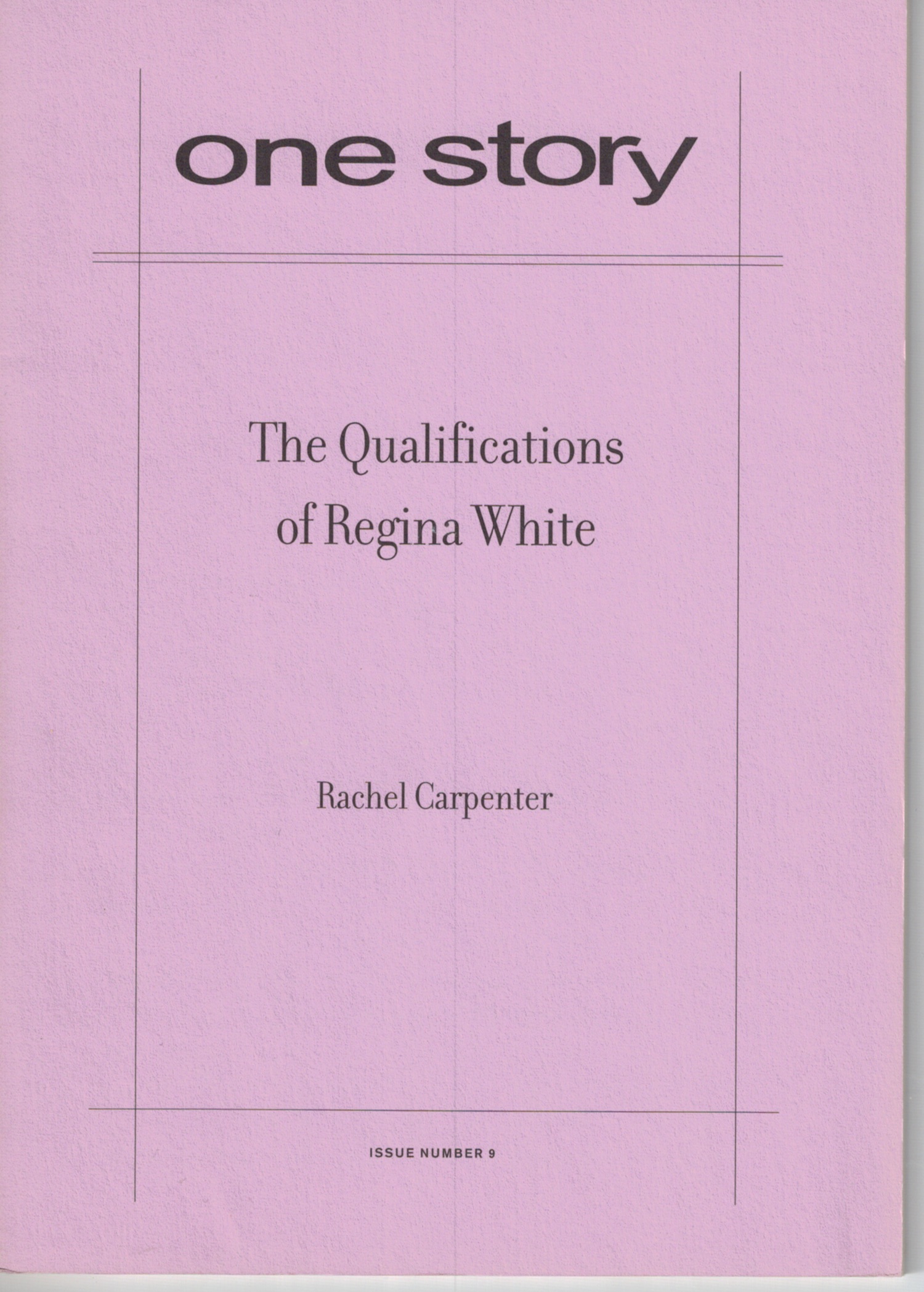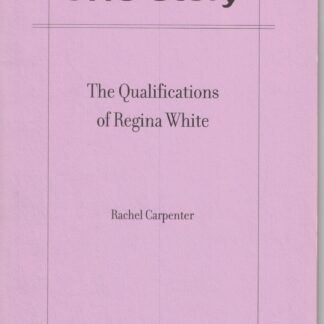
The Qualifications of Regina White
$2.50
21 in stock
Excerpt
Though it was several years ago now that I first met Regina White and had to deal with all of her annoying habits, I can remember almost every foolish detail. I can see her standing in the doorway of the bookstore, umbrella in hand though there was barely any rain that day and smiling as though she were ready to like all of us, though she really liked none of us except Roger Dellawood, and he only because he was the owner. May I speak to Mr. Dellawood, she said, no question mark ever in her voice.
Rachel Carpenter
Rachel Carpenter is a native of Philadelphia. Her nonfiction has appeared on mcsweeneys.net and has been read (by her) on NPR’s Anthem. Her short fiction has appeared in The Quarterly, Alaska Quarterly Review, and Confrontation, and the Sunday Magazine of the Philadelphia Inquirer; it’s also appeared on the atlantic.com and on mcsweeneys.net, and has been read (not by her) on the BBC World Service’s Short Story program. She is currently at work on a novel and a collection of stories.
Q&A by Hannah Tinti
- HT: Where did the idea of this story come from In particular, was it the narrative voice or the situation that sparked the writing?
- RC: It was totally the narrative voice, in particular the first line. But almost along with the first line came the title. By the end of the first paragraph I had the bookstore in there. The first paragraph just came out of left field but it made other stuff follow and amuse me, and I became interested in how obsessed a person could be.
- HT: What was the most challenging aspect of writing this story?
- RC: Probably not giving up on it. I wrote it, and rewrote it, during a time when I was moving from being preoccupied with one “theme” (okay, I was digesting my childhood) to being preoccupied with—well, the problem was that I didn’t know what with. But perhaps to call that a problem is not accurate. It was too long when I first finished it and a story needed to come from it more. It needed shaping. Some people—Abby Bardi, Sarah Manguso, and Hannah Tinti and Maribeth Batcha at One Story—helped trim and shape it and also helped me to see more clearly what it was and what it was doing or could do.
- HT: Have you ever worked in a book store?
- RC: My first non-babysitting job was cleaning a bookstore—rare and scholarly books, a few blocks from where I grew up in Philadelphia. I was about ten and the owner was a neighbor and a friend of our family. Then in college I worked for about a year at the Barnes and Noble there[, and was pretty sour].
- HT: Do you have a favorite book store?
- RC: I tend to just like exploring secondhand bookstores. I really love Mercer Street Books in New York. There’s a few in Philly and then there’s the Strand in NYC, which can be either really soothing or really depressing depending on your mood.
- HT: Can you tell us about a short story you read recently that you loved?
- RC: Recently, I’ve been reading more novels than stories, but I tend to hit Chekhov pretty regularly. I love Grace Paley and William Trevor and Eudora Welty. Edward P. Jones (Lost in the City) is tremendous and I’m looking forward to his first novel. Penelope Fitzgerald’s books are slender and wonderful and almost like really long stories.
- HT: How long did it take you to complete this story?
- RC: Years and years, with lots of time off. Since I write by hand, there was a lag even after I finished it in my notebook. 1996 - 2002 I guess.
- HT: What is the best bit of advice about writing you have ever received?
- RC: Hah! About 8 years ago, I heard Grace Paley read, and at the end a friend of mine asked her, “So what are your last words, what’s the advice you’d give someone?” and she said: “1. Keep a low overhead, 2. Don’t live with someone who doesn’t respect your writing, and...” - and then for about five years I couldn’t remember what her last piece of advice was, but I knew it had been three things. Then I wound up going to a Selected Shorts evening, where Linda Lavin and Robert Sean Leonard read her stuff and at the end there was another question and answer thing for her and the actors, and I couldn’t believe it but I stood up and said, You had these three pieces of advice that you gave a group once a few years ago...the first one was Keep a low overhead, the second was Don’t live with someone who doesn’t respect your writing, and what was the third? She said she usually varied the third and that lately she’d been saying not to chew gum, because it had ruined her teeth, but that the first two were the really important ones. That’s actually just a cute little anecdote (maybe), but her advice I think is dead on. And also just the usual thing, several people have said it, that you can’t guarantee success but you can guarantee failure by giving up.
- HT: What are you working on now?
- RC: An, aiee, novel, “The Return of Mr. Davies,” and a collection of stories. Actually there may be two collections going.
